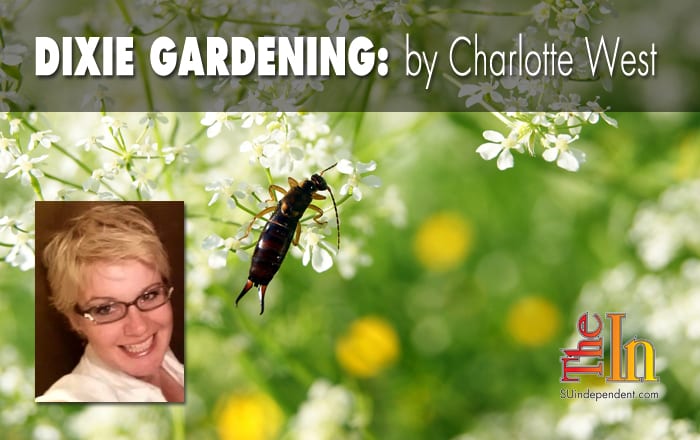 Written by Charlotte West
Written by Charlotte WestYes folks, it’s that time again. Earwigs are in full swing, and soon to follow is the mealybug. In heavily watered areas, you may also have an occasional slug or snail problem. But have no fear. You can win this battle.
Earwigs are not all bad, as they prey on aphids. But, on the negative side, they can destroy plants very quickly, causing damage to seedlings and damaging flower petals, some soft fruits, and corn silks. To prevent earwig damage, keep your garden clean, removing leaves and debris so that earwigs have very few hiding places. Several traps can be effective. At night, when earwigs are most active, place moistened, rolled-up newspapers or cardboard in the garden. In the morning, remove the bugs that have crept inside. You can also pour about ½ inch of vegetable oil into an empty tuna can (or some other small can). Place several of those in your garden . Earwigs can’t resist this tasty drink.
Mealybugs are also troublesome. You can recognize them by the soft, overlapping body plates, which tend to have a cottony white covering. Mealybugs can sometimes be confused with wooly aphids, but they are bigger than aphids. They suck plant juices and can cause stunting, sometimes killing plants. They tend to love to do damage as the weather really heats up. You can control them the organic way by knocking them off of plants with water jets or by using an organic, insecticidal soap. And if you control your ants, you can help keep mealybugs in check, as they love ants for their sweet honeydew. If you have a really bad infestation and have no problem using insecticides, you can turn to Malathion.
Slugs and snails can also be controlled fairly easily, but you must nip them in the bud quickly, as they can cause plant damage fast. They hide during the day wherever they can seek shelter. So besides cleaning up your garden, you can trap them by offering them a daytime hiding place simply by elevating a wood plank about an inch off the ground and before evening gather them up for disposal. Even shallow containers filled with beer or a simple solution of baking yeast and sugar mixed with about a cup of water will also do the trick. I recommend trying these methods before resorting to commercial methods, as they can be harmful to pets and birds.
You can win these battles with pests with fast action and with practically no money—the organic way.




